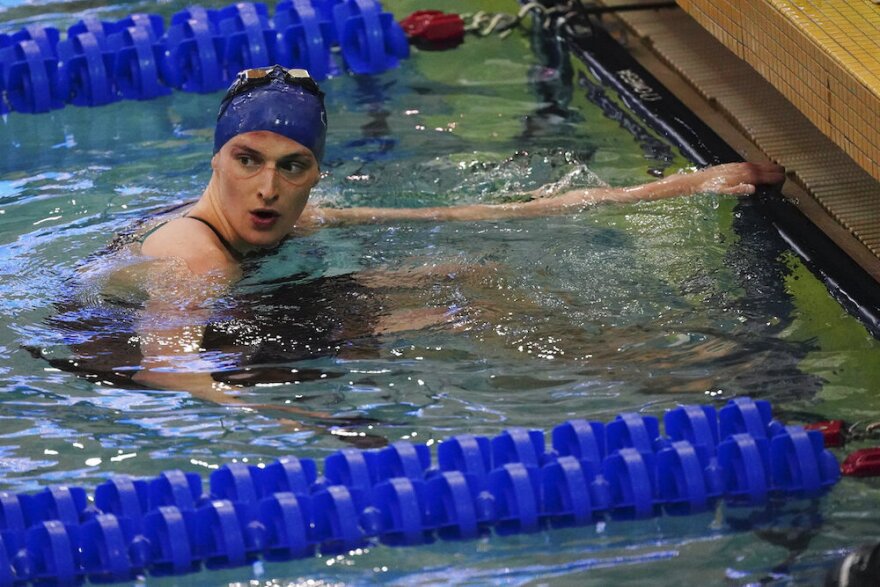HARRISBURG, Pa. - At a House education committee hearing Tuesday, state Rep. Barbara Gleim (R-Cumberland) spoke in detail about the bodies of transgender girls and women.
“They have larger hearts, greater lung capacity and more muscle mass than females,” Gleim said, using the word “males” for trans women. “For example, even after two full years of testosterone suppression, males still run faster than women.”
But Gleim, who doesn’t want trans girls competing in girls’ sports, didn’t have many more details. Gleim said she doesn’t know how many trans girls are playing girls’ sports in Pennsylvania. Same for trans women at the college level. She also doesn’t know how many trans people attend schools in Pennsylvania, nor how many trans people live in the state.
“No, to me that doesn’t matter,” Gleim said. “What really matters is protecting women’s sports, and making sure that biological women have their own category to compete in.”
So far, sporting organizations such as the PIAA and the NCAA have handled concerns about trans athletes when they come up. Gleim is the prime sponsor of a bill that would change that — barring trans girls from playing girls’ school sports and overriding those groups’ authority. The bill passed the education committee 15-9 along party lines. That sets it up for a potential House vote, although Democratic Gov. Tom Wolf signaled he’d veto it, calling it “disturbing and dangerous.”
As the proposal gains momentum, some critics say that it is unnecessary and sends a message to trans people that their gender identity is not accepted.
“For many trans girls, they don’t feel safe to be out to their peers,” said Preston Heldibridle, executive director of LGBTQ advocacy group Pennsylvania Youth Congress. This proposal puts a laser focus on trans teens who are already an isolated minority at their schools, he said in an interview.
Heldibridle said he stopped playing baseball and soccer when he came out as a trans boy in high school.
“When I came out, I was afraid that participating in team sports would make other people uncomfortable and really make a target out of me. But I never should have felt like that, and no other kid should as well.”
A couple prominent examples of trans women dominating their sports are fueling Republicans’ concerns. Lawmakers brought up University of Pennsylvania swimmer Lia Thomas, a trans woman who recently won a title at the national NCAA Women’s Division I championship.
Gleim also mentioned runner CeCe Telfer, a trans woman who previously competed as a man and who won a women’s 400-meter hurdles race in 2019.
At the committee meeting, lawmakers drew on those examples. State Rep. Martina White (R-Philadelphia) said it would be unfair for a girl to lose a spot on a roster to a trans girl — and potentially dangerous for a girl to have to tag out a trans girl running toward a base in a softball game.
“No one should be forcing biological females to be competing with biological males,” said White, who co-sponsored the bill. “It is patently wrong and unfair.”
Across the U.S., the topic has raised questions of fairness. Eleven states have passed laws similar to Gleim’s proposal, while 22 more are considering them. Last summer, more than 100 people packed a Lancaster Countyschool board meeting, calling on leadership to bar trans girls from playing girls’ sports.
Still, examples of trans athletes dominating in high school sports are rare, said Ron Kennedy, executive director of PIAA District 3.
“I don’t have an answer to the Lia Thomas thing,” Kennedy said. “I feel badly for those folks who were in that situation. But I just don’t know that having a broad-based policy that eliminates transgender athletes from competition is a good way to approach it.”
Kennedy recently retired from his role as athletic director at Donegal High School in Mount Joy, Lancaster County. He said, in nearly 30 years in youth sports, he never saw a trans athlete pose the types of issues that Republicans have brought up.
Like Gleim, Kennedy did not know how many trans girls and women are playing competitive sports. He said the number is small.
Partly due to the stigma trans people face, data on them has been historically difficult to get. In recent years, a 2016 study from the Williams Institute at the UCLA School of Law has become one commonly cited source. It estimates that 1.4 million trans adults live in the U.S. The study says about 43,800 trans adults live in Pennsylvania. That’s 0.44% of the population.
“Less than half of one percent,” Kennedy said. “We’re making policy on, I mean, miniscule numbers.”
Kennedy interviewed trans athletes for a doctoral program in education at Drexel — something he said opened his eyes to the unique stress trans people face. He pointed to a recent American Academy of Pediatrics study that found 42% of trans children and teens attempted suicide.
“This is a population of folks that have just been marginalized,” he said. “Every one of them said to me, we don’t sign up to be transgender to win the 100-meter dash. These are folks who are truly struggling with their identity and are unhappy until they make a transition, and then they become comfortable with themselves.”

